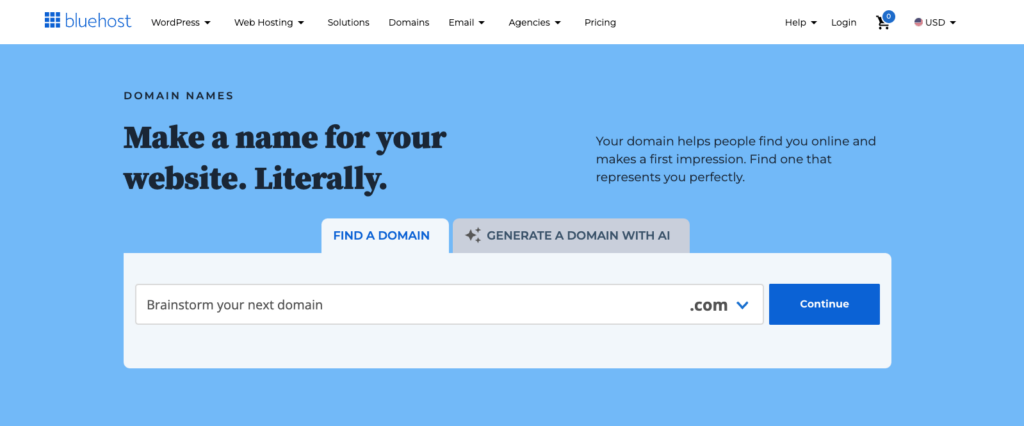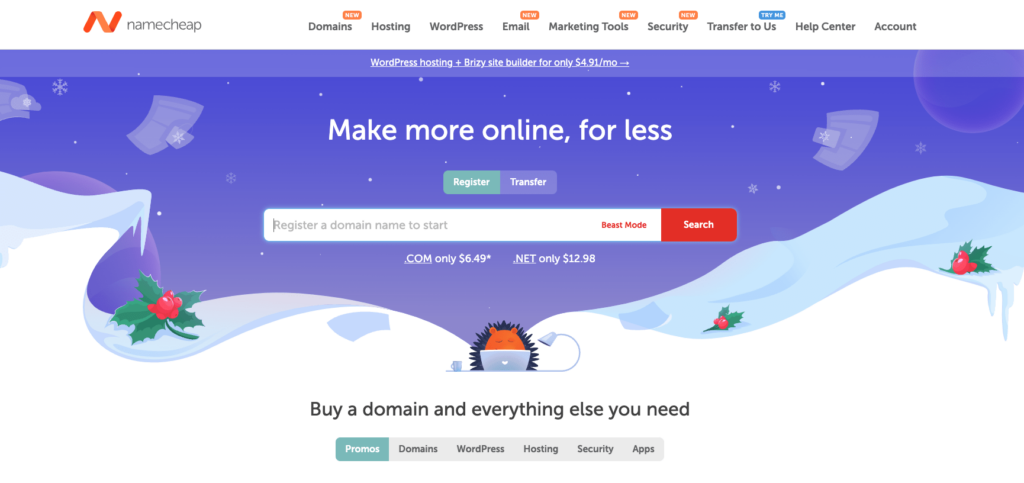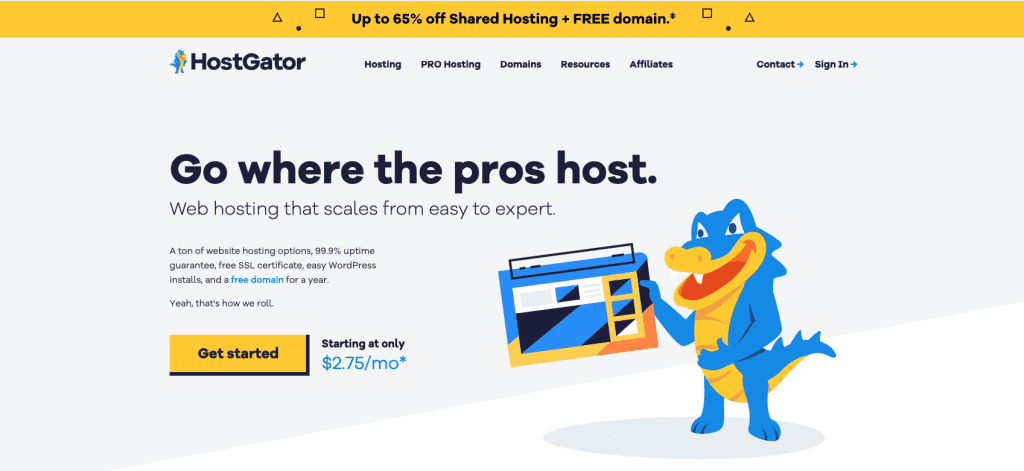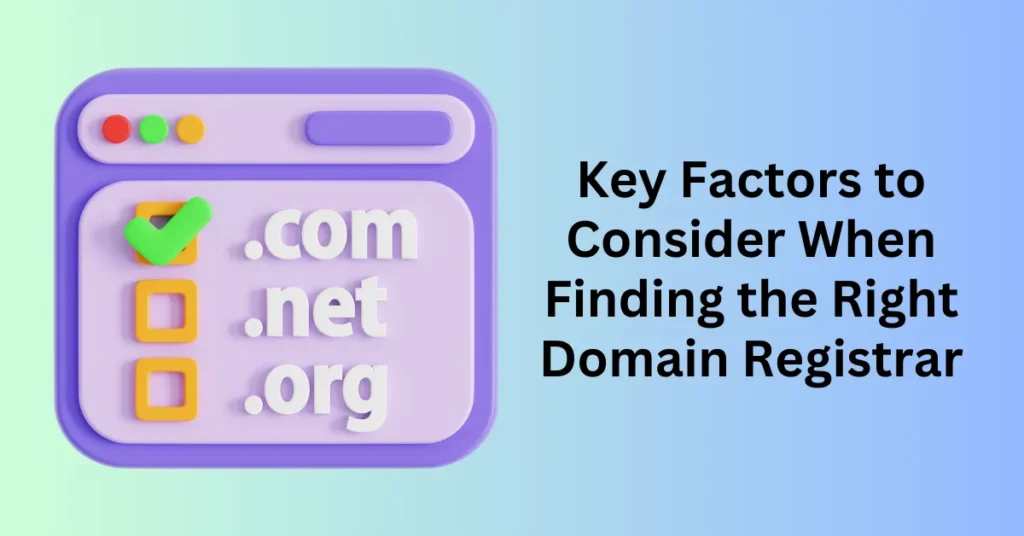Securing a domain name is one of the first steps in creating your online identity, but the journey doesn’t stop once you’ve chosen the perfect name. The next important decision is selecting the right domain registrar. This platform is where you’ll purchase and manage your domain name—an essential element of your website’s foundation. Your domain name isn’t just a random string of characters; it represents your business online, and it’s often the first point of contact potential customers will have with your brand.
In today’s crowded online space, where millions of websites already exist, finding a domain name that both reflects your brand and is still available can feel like a challenge. This is where a domain registrar comes in. A domain registrar is responsible for helping you secure your chosen domain name and offering tools to manage it as your website grows. However, not all registrars are created equal. They differ in terms of pricing, customer service, security features, and available tools for managing your domain.
Choosing the right domain registrar is crucial for a smooth and hassle-free website launch. The registrar you select impacts everything, from managing your domain to the support you receive when issues arise. To make an informed decision, consider a few key factors to ensure a seamless and secure registration process. Taking these elements into account will help get your site up and running, while also keeping it protected and operational in the long term.
Understanding a Domain Registrar
A domain registrar is a company that handles the registration and management of domain names—the web addresses used to access websites. When you choose a name for your site, the registrar checks if it’s available within the global domain system. If it’s available, they allow you to secure it. Once purchased, the domain is exclusively yours for the registration period, and no one else can claim it.
Domain registrars are essential to organizing the internet. They maintain a database of registered domain names, so you can quickly check if your desired domain is available. This helps you avoid conflicts and prevents the accidental selection of a name that’s already in use. By preventing duplicate registrations, they also help avoid potential legal disputes.
Choosing the right domain registrar is key for a smooth experience. Consider factors like user-friendly tools, customer support, pricing, and extra features, such as domain privacy protection. Whether you’re creating a personal blog or launching a professional site, selecting a reliable registrar ensures your domain is registered and managed smoothly, laying the groundwork for your online presence.
Key Considerations When Selecting a Domain Registrar
Finding the right domain registrar is a critical step in launching your website and ensuring its long-term success. A well-chosen registrar will make the process of acquiring and managing your domain seamless. Here’s what you should focus on:
Intuitive Platform and Ease of Use
A user-friendly interface is a must when selecting a registrar. The platform should streamline the domain search process, offering filters and alternative suggestions if your chosen domain name isn’t available. Navigating the interface should feel effortless, enabling you to secure your ideal domain with minimal hassle.
Transparent Pricing and Renewal Costs
Initial registration fees often grab attention, but don’t overlook renewal rates, which can vary significantly between providers. While registrars like Namecheap, Bigrock, or Google Domains might offer attractive first-year pricing, their renewal rates may be higher. Review pricing details for subsequent years to avoid unexpected costs down the line.
Wide Range of Domain Extensions
A versatile registrar will provide access to a broad selection of domain extensions, from popular choices like .com, .net, and .org to more specialized options such as .store or .blog. The ability to choose from a variety of extensions lets you align your domain with your brand’s identity and purpose.
Reliable Customer Support
Robust customer support can make all the difference when you encounter domain-related challenges. Look for registrars that offer 24/7 assistance via live chat, email, or phone. Quick and effective support ensures you can address technical issues or account concerns promptly.
By prioritizing these factors, you’ll be well-equipped to select a domain registrar that offers a seamless experience, fair pricing, and reliable support—setting a strong foundation for your online presence.
How to Choose the Right Domain Registrar for Your Website
When selecting a domain registrar, it’s crucial to consider the specific needs of your website. Your choice should reflect the purpose of your site and the level of support you require. Here’s what to keep in mind when making your decision:
Determine the Type of Domain You Need
The nature of your website will affect the registrar features you need. For personal blogs or small projects, a basic registrar with simple domain registration may be enough. However, for business websites, look for a registrar that offers strong customer support. Added security features like SSL certificates are important as well. Efficient management tools will also be beneficial.
If you’re launching an eCommerce store, consider a registrar that bundles domain registration with web hosting and website building tools. This can save you time and provide a more seamless setup.
Assess Your Customer Support Requirements
Consider the level of support you may need. If you’re unfamiliar with domain management or web hosting, it’s a good idea to choose a registrar that offers 24/7 customer service. Look for options like live chat, email, or phone support. For example, Bluehost is known for its exceptional customer service. They provide timely assistance whether you’re managing your domain or dealing with technical issues.
Look for Additional Services or Features
If you require services beyond domain registration, like hosting, email, or website builders, look for a registrar that offers these extras. A registrar such as Bluehost can provide a more integrated experience, especially for beginners. Managing everything from a single provider streamlines your workflow. It makes it easier to build and maintain your website without juggling multiple accounts or platforms.
By considering these factors, you’ll be able to select a domain registrar that meets both your current needs and long-term goals. This will provide a smooth experience for both you and your website visitors.
5 Best Domain Registrar to Choose From
Choosing the right domain registrar is crucial for your website’s long-term success. Below are some of the top domain registrars.
Bluehost Domain Registrar
While Bluehost is widely recognized for its web hosting services, it also offers domain registration. When you sign up for hosting, Bluehost provides a free domain for the first year, which can be especially beneficial for those looking to bundle their services for simplicity and cost savings.

Bluehost’s shared hosting plans come with competitive pricing, and if you’re looking to build a WordPress website, Bluehost is a recommended hosting provider due to its optimized WordPress hosting services, including automatic updates.
Bluehost offers Domain Privacy + Protection as an optional add-on. This service helps protect your personal contact details by replacing them with generic Bluehost information in the WHOIS database, which is ideal for those who value privacy. For certain hosting plans like Choice Plus and Pro, this protection is included at no extra cost, providing great value for users on these plans. However, if you’re registering a domain individually, privacy protection comes with an additional cost after the first year.
Bluehost’s domain registration includes useful features like auto-renewal and domain locking. These tools prevent unauthorized domain transfers and help ensure your domain remains secure. The easy-to-use dashboard allows you to manage both your domains and hosting services in one place, simplifying the website management process.
Bluehost’s customer support is one of its standout features. Their team is available around the clock through live chat, phone, and email, making it easy to get assistance whenever needed. Whether you need help with domain management or resolving technical issues, their support team ensures you’re never left in the dark.
Pros
- Comprehensive service offering: Bluehost provides an all-in-one solution, including hosting, website builders, email hosting, and domain registration, making it ideal for businesses that want convenience.
- Easy-to-navigate interface: Manage your domains, hosting, and websites from a single, intuitive platform.
- Affordable pricing: Bluehost’s competitive domain registration rates, especially when bundled with hosting, make it a cost-effective choice for website owners.
- WordPress hosting leader: As a recommended WordPress hosting provider, Bluehost’s features and performance make it particularly valuable for businesses focusing on WordPress websites.
Cons
- Privacy protection as a paid add-on: While Domain Privacy + Protection is free for the first year, it becomes a paid service thereafter. This is a relatively small cost considering the overall value Bluehost offers.
- Higher renewal rates: While the initial registration price is affordable, the renewal rates can be higher. To avoid unexpected increases, consider purchasing a domain for an extended period (e.g., 5 or 10 years).
Overall, Bluehost provides a robust and reliable solution for domain registration, especially if you are looking for an integrated platform with excellent customer support, privacy protection options, and affordable rates.
Namecheap Domain Registrar
Namecheap makes finding the right domain name easy with its intuitive domain search tool. Users can quickly search for domain names using keywords, variations, or specific price ranges. This simplifies the domain search process, saving time and helping users find the perfect domain faster. For bulk registrations, Namecheap allows you to upload a CSV file with a list of domains, streamlining the process for large-scale purchases.

One of the standout features of Namecheap is its free lifetime domain privacy protection. This helps keep your personal contact information secure. The feature is included with all domain registrations. It ensures that your details are not exposed in public WHOIS databases. This adds an extra layer of privacy and security.
Namecheap offers a variety of add-ons to support website creation and management. These include shared hosting, WordPress hosting, DNS hosting, and SSL certificates for securing HTTPS connections. This makes Namecheap a one-stop shop for those looking to register a domain, build, and secure a website.
For those interested in domain flipping or acquiring premium domains, Namecheap integrates with Sedo. Sedo is a major domain marketplace where users can bid on valuable domains. Namecheap also offers handshake domains. These domains are based on a decentralized blockchain system, providing users with the opportunity to explore new and unique domain extensions.
Pros
- Free lifetime domain privacy protection: Secure your personal information without additional fees for WHOIS privacy.
- Easy-to-use search tool: Find domains quickly with options to search by keywords, price ranges, and variations.
- Bulk domain registration: Register up to 5,000 domains at once by uploading a CSV file, making it easier for users with large-scale domain needs.
- Domain vault: Provides extra security for your domains by monitoring DNS changes and limiting access to protect against unauthorized transfers.
- Sedo marketplace integration: Bid on premium domains or find valuable domain names through the Sedo platform.
- Handshake domains: Access decentralized, blockchain-based domains for unique extensions.
- Affordable pricing: Competitive rates on domains and hosting, often with discounts for bulk purchases or long-term registrations.
Cons
- Mixed customer support feedback: While 24/7 live chat is available, some users report slower response times or inconsistent quality of support.
- Renewal pricing may vary: While initial domain registration is affordable, renewal rates can sometimes be higher, particularly for certain domain extensions.
- Limited advanced features for large businesses: While Namecheap offers essential hosting and SSL certificates, it may not have the extensive feature set that larger businesses or more complex websites require.
Overall, Namecheap is an excellent choice for those looking for an easy-to-use registrar, free privacy protection, and affordable pricing. It also stands out for bulk domain registration and integration with domain marketplaces for those seeking premium or decentralized domains.
Domain.com Domain Registrar
With over 300 domain extensions available, Domain.com provides ample options for customizing your domain based on your website’s focus. Whether you’re looking for popular options like .com or more niche extensions such as .store or .tech, you’ll find a variety of choices to suit your needs.

Domain.com features an AI-powered domain search tool, allowing users to find the perfect domain quickly. By entering simple prompts or specifying criteria like domain length, keywords, and preferred extensions, the tool generates domain name suggestions. While the tool is helpful, it’s worth noting that the results may not always be perfectly aligned with your preferences, especially when searching with more specific criteria.
Unlike many other registrars, Domain.com includes WHOIS privacy protection by default with your domain registration. This protects your personal contact information from being publicly visible in the WHOIS database. However, this feature can increase the overall cost of your domain registration, so be mindful of it when checking out.
In addition to domain registration, Domain.com offers the option to bundle services like web hosting, WordPress hosting, and their website builder. This is convenient for those seeking an all-in-one solution. However, the company does not provide cloud or VPS hosting, which could be a limitation for users with more advanced hosting needs.
Pros
- Large selection of domain extensions: Over 300 domain extensions to match your website’s niche or industry.
- AI-powered domain search tool: Quickly find domain name ideas based on your preferences and keywords.
- Automatic domain expiration protection: If a payment fails, Domain.com will extend your domain for an additional year, preventing accidental expiration.
- Free matching domain with .online extension: Some domain registrations come with a free matching .online extension and privacy protection, adding extra value.
Cons
- Bundled WHOIS privacy: WHOIS privacy protection is automatically included, which could result in an unexpected charge if you overlook it during checkout.
- Limited hosting options: Domain.com does not offer cloud or VPS hosting, making it less suitable for those who need more advanced hosting solutions.
Overall, Domain.com is a solid choice for those looking for a wide selection of domain extensions, user-friendly tools, and bundled services. However, it’s important to pay attention to the automatic inclusion of WHOIS privacy and the limited hosting options available.
HostGator Domain Registrar
One of the key benefits of choosing HostGator is the inclusion of a free domain with your hosting plan. This can be an excellent deal for those starting a new website and looking to save money on domain registration. By bundling hosting and domain registration, HostGator provides convenience and value in one package.

HostGator offers a wide range of domain options, so even if your desired .com or .org domain is unavailable, you can find alternative extensions like .net or others. This flexibility can help you secure a domain that aligns with your brand or business, even if your first choice isn’t available.
To help prevent unauthorized domain transfers, HostGator automatically locks your domains. They also offer automatic domain renewal, ensuring that you don’t accidentally lose your domain due to an expired registration. However, it’s important to check renewal rates, as they may be higher than the initial registration price.
While HostGator offers WHOIS privacy protection, it is an additional paid service. This feature can help keep your personal contact information secure by replacing it with generic data in the WHOIS database. If privacy is a priority for you, this service will come at an added cost.
Pros
- Affordable pricing: HostGator offers competitive pricing for domain registration, especially when bundled with hosting plans.
- Free domain with hosting plans: Get a free domain when purchasing a hosting plan, providing great value for new website owners.
- Excellent customer support: 24/7 customer support via live chat and phone ensures that help is always available whenever you need it.
- Top-tier uptime: HostGator is known for reliable uptime, ensuring that your website and domain remain secure and accessible.
- Convenience: Since HostGator provides both hosting and domain registration services, managing everything from a single platform is simple and efficient.
Cons
- Higher renewal rates: While HostGator offers low initial pricing, renewal rates can be higher, so it’s important to keep track of your renewal costs.
- WHOIS privacy protection comes at a cost: WHOIS privacy is not included in the basic package and must be purchased separately.
- Not ideal for domain-only customers: If you only need domain registration without hosting services, other registrars may offer more competitive prices for domain-only purchases.
HostGator is a solid choice for users who need both domain registration and hosting services in one place. Its free domain with hosting plans and excellent customer support make it a convenient and cost-effective option, though the renewal rates and extra charges for WHOIS privacy are factors to keep in mind.
DreamHost Domain Registrar
When you register a domain with DreamHost, you receive free private WHOIS registration. This service protects your personal contact details by replacing them with DreamHost’s information in the WHOIS database, helping to keep your privacy secure.

DreamHost takes the hassle out of domain and security management by automatically renewing both, ensuring you don’t miss important updates and keeping your website running smoothly without needing to manually track renewals.
In addition to domain registration, DreamHost offers a variety of hosting services, including shared, VPS, dedicated hosting, and cloud solutions. This flexibility allows you to scale your hosting needs as your business grows.
DreamHost provides unlimited subdomains, making it a great option for businesses that require multiple subdomains for different sections of their website or various services.
DreamHost offers 24/7 customer support through live chat, phone, and email, ensuring you can get help whenever you need it.
Pros
- Free private WHOIS registration: Protects your personal information and replaces it with DreamHost’s contact details.
- Automatic renewals: Ensures domains and security features are automatically renewed without the risk of forgetting.
- Comprehensive hosting services: Offers a range of hosting options including shared, VPS, and dedicated hosting, making it easy to find a plan that fits your needs.
- Unlimited subdomains: Ideal for businesses with multiple sections or services to organize.
- Reliable customer support: Available 24/7 to help resolve issues quickly.
- Clear pricing: Known for transparent pricing with no hidden fees.
Cons
- Limited domain management tools: While DreamHost offers basic management options, it may lack some advanced features compared to other registrars.
- Higher costs for certain services: Some hosting options and add-ons may come at a higher price than similar services offered by other providers.
- Mixed reviews on domain transfer process: Some users report difficulties when transferring domains away from DreamHost, particularly with handling the transfer process.
DreamHost is a solid choice for those seeking both domain registration and reliable hosting, especially with its free privacy protection and seamless renewal system. While it may not offer the most advanced domain management features, it provides a comprehensive, user-friendly experience that’s ideal for businesses of various sizes.
Domain Search and Registration Process with Domain Registrar
Registering a domain with Bluehost is a straightforward and user-friendly process. Here’s a step-by-step guide:
1. Search for Your Domain Name
To begin the domain registration process, visit the Bluehost website and navigate to their Domain Name Search tool. In the search bar, type in the desired domain name for your website and click the “Search” button. Bluehost will then check if the domain is available or already taken. If it’s available, you’ll be able to proceed with registration. If it’s already taken, Bluehost will provide alternative suggestions or give you the option to try a different name.
2. Choose Your Domain Extension
After finding a domain name that works for you, it’s time to choose the right domain extension. Bluehost offers a wide selection of domain extensions such as .com, .net, .org, .store, and more. You can select the one that best represents your brand or business. If the domain extension you want is already taken, Bluehost will offer alternative extensions or suggestions to help you find a suitable option.
3. Add It to Your Cart
Once you’ve found the perfect domain name and extension, simply click on the “Add to Cart” button. This will reserve the domain for you and add it to your shopping cart. If the domain is available, you can proceed with the next steps to complete your registration.
4. Complete the Registration
To complete the registration process, you’ll need to create a Bluehost account if you don’t already have one. If you’re a returning customer, you can log in to your existing account. Then, you’ll be asked to enter your contact information and other necessary details to finalize your registration and secure your domain.
5. Choose Your Hosting Plan (Optional)
If you plan to host your website with Bluehost, you can select a hosting plan during the checkout process. Bluehost offers various hosting options such as shared hosting or WordPress hosting. Bundling hosting with domain registration simplifies the process and saves you time. You can choose the plan that best suits your website’s needs.

6. Review and Complete Your Order
Before finalizing the order, take a moment to review your domain registration details. If you’ve selected a hosting plan, double-check that everything is in order. Once you’re satisfied with the details, confirm your order and proceed to payment. Bluehost will then complete your domain registration and send a confirmation email to let you know everything is set up.
7. Manage Your Domain
After registering your domain, you can manage it directly from your Bluehost account dashboard. From here, you can adjust domain settings, set up email addresses associated with your domain, and even transfer the domain if needed. Bluehost’s user-friendly dashboard gives you full control over your domain and website management.
By following these steps, you’ll have your domain registered and ready to use in no time, with Bluehost providing a seamless process from start to finish.
Domain Registration: Key Practices for Success
Securing a domain is a foundational step in establishing your online presence. It’s important not just to choose any domain, but to pick one that aligns with your brand and offers strong protection. Below are some essential best practices to follow when registering your domain:
1. Select a Memorable and Brand-Relevant Domain Name
Your domain name is often the first impression customers will have of your business, so make sure it’s easy to spell, short, and meaningful. The best domains reflect the essence of your brand or the products/services you offer. A straightforward, memorable name will help customers easily recall your website, making it more accessible and encouraging repeat visits. Steer clear of overly complex or lengthy names that could cause confusion or be challenging for people to type into their browsers.
2. Choose a Reliable Domain Registrar
When selecting a domain registrar, prioritize reliability and customer support. Choose one that offers affordable pricing and an intuitive interface for managing your domain. Reputable registrars like Bluehost are known for their dependable services. They make it easier to handle domain tasks and provide excellent customer service when you need help.
3. Use WHOIS Privacy Protection
WHOIS privacy protection is a crucial service that shields your personal information from being publicly visible in WHOIS databases. This simple step can safeguard you against potential spam, unwanted solicitations, and even identity theft. Although many registrars charge a fee for this service, it’s a worthwhile investment in your online security. By using WHOIS privacy, you ensure that your contact details remain confidential and that only your registrar’s information is visible to the public.
4. Lock Your Domain for Extra Security
Domain locking is a simple yet powerful security feature that prevents unauthorized transfers of your domain name. When your domain is locked, no one can move it to another registrar without your explicit permission. This added layer of protection helps prevent cybercriminals from hijacking your domain, offering peace of mind that your online presence is secure.
5. Set Up Renewal Reminders to Prevent Domain Loss
To avoid losing your domain and its services, set up reminders well before the expiration date. It’s easy to forget about renewals. Failing to renew on time can result in losing access to your domain. This can disrupt your website and damage your brand’s credibility. Most registrars offer automatic renewal. However, it’s still a good idea to manually check your domain’s status. Set up reminders to stay ahead of the expiration date.
Final Thoughts: Key Factors to Consider When Finding the Right Domain Registrar
Choosing the right domain registrar is a pivotal decision in establishing a strong online presence. A trustworthy registrar goes beyond simply securing your domain name; it also provides the necessary tools and support for hassle-free registration and ongoing management of your website.
When making your decision, it’s important to evaluate key factors like competitive pricing, customer support quality, security features, and the platform’s ease of use. Considering these aspects will help you choose a registrar that not only keeps your domain safe but also supports your business over the long term.
If you’re ready to register your domain and kick off your online journey, consider Bluehost. With comprehensive services including domain registration and reliable web hosting, Bluehost offers everything you need under one roof. Their 24/7 customer support and seamless integration make it easy to get started and stay on track as you grow your online business.


